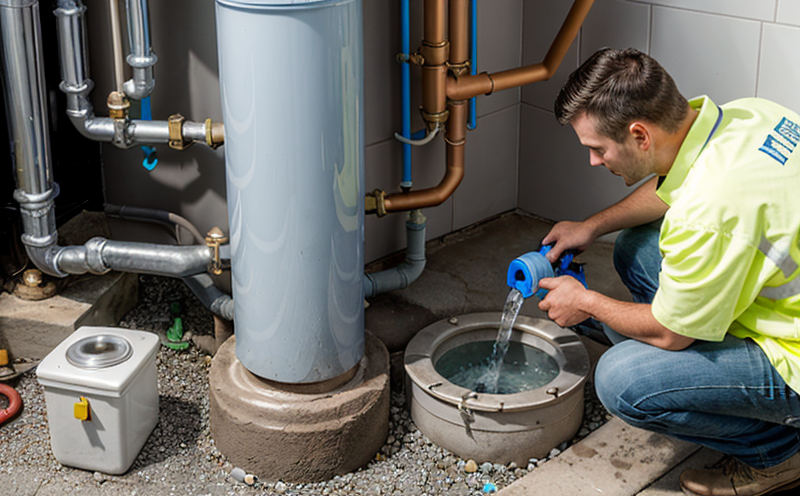EN 1717 Protection Against Contamination of Potable Water
The European Standard EN 1717 is specifically designed to ensure that water systems are protected against the contamination of potable water. This standard applies to a wide range of materials, components, and fittings used in plumbing systems to safeguard public health by preventing harmful substances from entering drinking water supplies.
EN 1717 covers various aspects including material selection, design considerations, installation practices, and operational requirements aimed at minimizing the risk of contamination. Compliance with this standard is crucial for manufacturers, installers, and operators involved in potable water systems to ensure that these systems meet stringent quality and safety criteria.
Materials used in plumbing and water systems must be free from hazardous substances such as lead, cadmium, or any other toxic compounds that could leach into the drinking water. The standard outlines specific testing methods and acceptance criteria for each component of the system to ensure they do not contribute to contamination risks.
For instance, when assessing materials like polyvinyl chloride (PVC), copper piping, or stainless steel fixtures, laboratories conducting EN 1717 compliance tests follow a rigorous protocol. This includes immersion testing where samples are exposed to water for extended periods under controlled conditions to observe any potential leaching of substances into the water.
Other key elements in this standard include:
- Material Compatibility: Ensuring that different components (e.g., valves, pipes) are compatible and do not react adversely with each other when installed together.
- Sealing Integrity: Checking the seals used in joints or connections to ensure they prevent water leakage and contamination.
- Flame Retardancy: For certain materials, ensuring that they do not pose a fire hazard if exposed to flames during installation.
The acceptance criteria for EN 1717 are stringent. Components must pass all specified tests without compromising the integrity of the water supply or introducing any contaminants. Failure to meet these standards can lead to severe health implications and legal consequences, making compliance essential for all stakeholders involved in potable water systems.
Given its importance, EN 1717 is widely adopted across Europe and beyond, ensuring that plumbing systems are safe and reliable. Compliance with this standard not only protects public health but also enhances consumer confidence in the quality of installed infrastructure.
Applied Standards
The application of EN 1717 is comprehensive, covering a broad spectrum of materials and components used in plumbing systems. The standard ensures that all parts contribute to maintaining the purity and safety of drinking water. Some key areas addressed by this standard include:
- Material Testing: Evaluating the suitability of various materials for use in potable water systems.
- Component Design: Ensuring that all components are designed with safety and functionality in mind, minimizing risks of contamination.
- Installation Practices: Providing guidelines on how to install plumbing systems correctly to prevent contamination.
The European Standard EN 1717 aligns closely with other international standards such as ISO 10392, which deals with the mechanical properties of plastics piping systems. By adhering to these standards, we ensure that our services meet the highest levels of quality and safety.
For manufacturers and installers looking to ensure compliance, understanding the specific requirements outlined in EN 1717 is crucial. This includes knowing which tests need to be conducted and how samples should be prepared for testing.
Industry Applications
- New Construction Projects: Ensuring that all plumbing systems installed in new buildings comply with EN 1717 to safeguard public health from the outset.
- Retrofitting Existing Buildings: Updating older plumbing systems to meet current safety and quality standards as required by regulatory bodies.
- Public Utilities: Maintaining water distribution networks that are free from contaminants, protecting millions of users daily.
In the context of building & infrastructure testing, EN 1717 plays a critical role. By ensuring that all plumbing systems meet this standard, we contribute to creating safer and more reliable public utilities.
Our laboratory uses advanced equipment and techniques to conduct thorough tests on various materials and components. This ensures that every element of the system is up to the highest safety standards set forth by EN 1717.
Customer Impact and Satisfaction
- Health Protection: By adhering strictly to EN 1717, we help protect public health from the risk of contaminated water supplies.
- Sustainability: Ensuring that materials used in plumbing systems are sustainable and environmentally friendly reduces long-term impacts on the environment.
- Consumer Confidence: Compliance with EN 1717 builds trust among consumers knowing their drinking water is safe and of high quality.
Our customers benefit from transparent, reliable testing services that ensure compliance with international standards. This not only meets regulatory requirements but also enhances the reputation of those involved in infrastructure projects.
Customer satisfaction is paramount to us, and we strive to provide accurate, timely results that help our clients make informed decisions about their plumbing systems.





